- Details
- Written by Site Editor
- Category: Headline News
Special Edition:
| Mourning for Xi Weiguo and Wang Lecheng |
| Edition Home | The grieve of the Democratic Movement in NZ | Eulogy by FDC's Chairman | Eulogy by FDC USA | | FDC Home Page | Eulogy from Australia | Eulogy by HR Watch China | Related news reports | Memorial album | |
News reports on the death of Xi Weiguo and Wang Lecheng
- Hits: 8972
- Details
- Written by Site Editor
- Category: Headline News
A Chinese Claims Group formally established
to sue the CCP for its COVID-19 virus
In order to make the CCP responsible for deceiving Chinese and the people in the world and covering up the truth, causing irreparable loss of lives and financial losses to the COVID-19, the Group formally sued the Chinese Communist Party and its ruling government headed by Xi Jinping.
The Chinese lawsuit group accused Xi Jinping and the CCP Virus Flooding / Group for Law suit Against CCP Xi Jinping Coronavirus Originator has 130 people in the telegram group. Today officially entered the legal process.
The Chinese Group accused of the CCP virus, and the Claims Group was formally established to cooperate with The Berman Law Group. Anyone can request a lawsuit from the CCP criminal regime to visit http://www.demandchinapay.org/ and visit http://www.demandchinapay.org/ and provide the required information, then click "Join litigation". After completing the description of the loss, please make sure that they include "Jian Jin" in the message box to know that you are a member of the group.
Currently, Berman LawGroup is working with lawyers and law firms around the world to assist in the development and creation of methods to sue China in accordance with the laws and regulations of the country. If we are unable to create a class based on current class actions, we also hope that individual actions may be filed on behalf of foreign citizens in the United States.
The contacts of the Law Suit:
Bomen Lawyers Group / THE BERMAN LAW GROUP
Office Address: 3351 NW Boca Raton Blvd., Boca Raton, FL 33431
Mailing Address: P.O. Box 272789, Boca Raton, FL 33427
Phone: (561) 826-5200 ● Telegram: (561) 826-5201
E-mail: This email address is being protected from spambots. You need JavaScript enabled to view it.
- Hits: 4309
- Details
- Written by 网站编辑
- Category: Headline News
USA Congress ‘‘Uyghur Human Rights Policy Act of 2019’’
116TH CONGRESS
1ST SESSION
IN THE SENATE OF THE UNITED STATES
Mr. RUBIO introduced the following bill; which was read twice and referred to the Committee on __________________
__________________
A BILL
To condemn gross human rights violations of ethnic Turkic Muslims in Xinjiang, and calling for an end to arbitrary detention, torture, and harassment of these communities inside and outside China.
Be it enacted by the Senate and House of Representatives of the United States of America in Congress assembled,
SECTION 1. SHORT TITLE.
This Act may be cited as the ‘‘Uyghur Human Rights Policy Act of 2019’’.
SEC. 2. STATEMENT OF PURPOSE.
The purpose of this Act is to direct United States resources to address gross violations of universally recognized human rights, including the mass internment of over 1,000,000 Uyghurs and other predominately Muslim ethnic minorities in China and the intimidation and threats faced by United States citizens and legal permanent residents.
SEC. 3. APPROPRIATE CONGRESSIONAL COMMITTEES.
In this section, the term ‘‘appropriate congressional committees’’ means—
(1) the Committee on Foreign Relations, the Committee on Armed Services, the Select Committee on Intelligence, the Committee on Banking, Housing, and Urban Affairs, the Committee on the Judiciary, and the Committee on Appropriations of the Senate; and
(2) the Committee on Foreign Affairs, the Committee on Armed Services, the Permanent Select Committee on Intelligence, the Committee on Financial Services, the Committee on the Judiciary, and the Committee on Appropriations of the House of Representatives.
SEC. 4. FINDINGS.
Congress makes the following findings:
(1) The Government of the People’s Republic of China (PRC) has a long history of repressing approximately 13,000,000 Turkic, moderate Sunni Muslims, particularly Uyghurs, in the nominally autonomous Xinjiang region. These actions are in contravention of international human rights standards, including the Universal Declaration of Human Rights and the International Covenant on Civil and Political Rights.
(2) In recent decades, central and regional Chinese government policies have systematically discriminated against Uyghurs, ethnic Kazakhs, and other Muslims in Xinjiang by denying them a range of civil and political rights, including the freedoms of expression, religion, movement, and a fair trial, among others.
(3) Increased unrest in the Xinjiang region as a result of the central government’s severe repression is used in Orwellian fashion by the Government of the People’s Republic of China as evidence of ‘‘terrorism’’ and ‘‘separatism’’ and as an excuse for further disproportionate response.
(4) In 2014, Chinese authorities launched their latest ‘‘Strike Hard against Violent Extremism’’ campaign, in which the pretext of wide-scale, internationally linked threats of terrorism were used to justify pervasive restrictions on, and gross human rights violations of, the ethnic minority communities of Xinjiang.
(5) Those policies included—
(A) pervasive, high-tech surveillance across the region, including the arbitrary collection of biodata, including DNA samples from children, without their knowledge or consent;
(B) the use of QR codes outside homes to gather information on how frequently individuals pray;
(C) facial and voice recognition software and ‘‘predictive policing’’ databases; and
(D) severe restrictions on the freedom of movement across the region.
(6) Chinese security forces have never been held accountable for credible reports of mass shootings in Alaqagha (2014), Hanerik (2013), and Siriqbuya (2013), as well as the extrajudicial killings of Abdulbasit Ablimit (2013) and Rozi Osman (2014).
(7)(A) The August 2016 transfer of former Tibet Autonomous Region Party Secretary Chen Quanguo to become the Xinjiang Party Secretary prompted an acceleration in the crackdown across the region.
(B) Local officials in Xinjiang have used chilling political rhetoric to describe the purpose of government policy including ‘‘eradicating tumors’’ and ‘‘spray[ing] chemicals’’ on crops to kill the ‘‘weeds’’.
(C) Uyghurs are forced to celebrate Chinese cultural traditions, such as Chinese New Year, and unique Uyghur culture is facing eradication due to state control over Uyghur cultural heritage, such as muqam (a musical tradition) and meshrep (tradi11 tional cultural gatherings), and due to elimination of the Uyghur language as a medium of instruction in Xinjiang schools and universities.
(8) In 2017, credible reports found that family members of Uyghurs living outside of China had gone missing inside China, that Chinese authorities were pressuring those outside the country to return, and that individuals were being arbitrarily detained in large numbers.
(9) There is ample credible evidence provided by scholars, human rights organizations, journalists, and think tanks substantiating the establishment by Chinese authorities of ‘‘political reeducation’’ camps.
(10) Independent organizations conducted interviews, including testimonies from Kayrat Samarkan, Omir Bekali, and Mihrigul Tursun, along with others who had been detained in such facilities, who described forced political indoctrination, torture, beatings, food deprivation, and solitary confinement, as well as uncertainty as to the length of detention, humiliation, and denial of religious, cultural, and linguistic freedoms, and confirmed that they were told by guards that the only way to secure release was to demonstrate sufficient political loyalty. Poor conditions and lack of medical treatment at such facilities appear to have contributed to the deaths of some detainees, including the elderly and infirm. Uyghurs Muhammed Salih Hajim (2018), Yaqupjan Naman (2018), Abdughappar Abdujappar (2018), Ayhan Memet (2018), Abdulreshit Seley Hajim (2018), Nurimangul Memet (2018), Adalet Teyip (2018), Abdulehed Mehsum (2017), Hesen Imin (2017), and Sawut Raxman (2017) reportedly died while in the custody of the Chinese authorities in ‘‘political reeducation’’ camps, without proper investigation of the circumstances.
(11) Uyghurs and Kazakhs, who have now obtained permanent residence or citizenship in other countries, attest to receiving threats and harassment from Chinese officials.
(12) Under pressure from the Government of the People’s Republic of China, countries have forcibly returned Uyghurs to China in violation of the non-refoulement principle and their well-founded fear of persecution. States returning Uyghurs include Egypt (2017), the United Arab Emirates (2017), Malaysia (2011, 2013), Thailand (2011, 2015), Laos (2010), Burma (2010), Cambodia (2009), Vietnam (2014), Kazakhstan (1999, 2001, 2003, 2006), Uzbekistan (2007), Tajikistan (2011), Pakistan (2003, 2009, 2011), Nepal (2002), and India (2016).
(13) Six journalists for Radio Free Asia’s Uyghur service have publicly detailed abuses their family members in Xinjiang have endured in response to their work exposing abusive policies across the region.
(14) Several United States-based companies are conducting business with Xinjiang authorities without sufficient due diligence or safeguards to ensure their business operations do not create or contribute to human rights violations.
(15) The Government of the People’s Republic of China is increasingly investing in the ‘‘Belt and Road Initiative’’ across Xinjiang and throughout Central Asia, extending its influence through organizations such as the Shanghai Cooperation Organization without regard to the political, cultural, or linguistic rights of ethnic minorities.
(16) The Secretary of State, Congressional-Executive Commission on China, Tom Lantos Human Rights Commission, and individual members of the executive branch and Congress have all expressed growing concern regarding the pervasive human rights abuses across Xinjiang and the ‘‘political reeducation’’ camps.
(17) In August 2018, the United Nations Committee to Eliminate Racial Discrimination challenged the Government of the People’s Republic of China over abuses in Xinjiang, including the establishment of mass arbitrary detention camps.
(18) Between August and September 2018, Chinese authorities responded to these allegations by either flatly denying them or insisting that the facilities are ‘‘vocational training centers’’.
(19) In September 2018, newly appointed United Nations High Commissioner for Human Rights Michele Bachelet noted in her first speech as High Commissioner the ‘‘deeply disturbing allegations of large-scale arbitrary detentions of Uighurs and other Muslim communities, in so-called re-education camps across Xinjiang’’.
(20) On September 18, 2018, the Washington Post editorial board wrote, ‘‘At stake is not just the welfare of the Uighurs, but also whether the technologies of the 21st century will be employed to smother human freedom.’’
(21) In December 2018 testimony before the Subcommittee on East Asia, the Pacific, and International Cybersecurity Policy of the Committee on Foreign Relations of the Senate, Deputy Assistant Secretary for Democracy, Human Rights and Labor Scott Busby testified that the number of those detained in camps since April 2017 was ‘‘at least 800,000 and possibly more than million’’.
(22) In December 2018, independent media reports pointed to growing evidence of forced labor in the camps, as well as reports of individuals who have been released from camps being forced to labor in nearby factories for low wages under threat of being sent back to ‘‘political reeducation’’ camps.
(23) In December 2018 and January 2019, Chinese officials organized visits to ‘‘political reeducation’’ camps in Xinjiang for a small group of foreign journalists and diplomats from non-Western countries. In the months preceding the visits, international media reported that officials worked to remove security features from some ‘‘political reeducation’’ facilities, and coached detainees and area residents not to make negative comments about the camps. Reports also indicated that officials had transferred large numbers of detainees to detention facilities in other parts of China.
(24) Experts have described the Xinjiang region as ‘‘a police state to rival North Korea, with a formalized racism on the order of South African apartheid’’ and the repression in the Xinjiang region as a ‘‘slow motion Tiananmen’’.
SEC. 5. SENSE OF CONGRESS.
It is the sense of Congress that—
(1) the President should condemn abuses against Turkic Muslims by Chinese authorities in Xinjiang and call on Chinese President Xi Jinping to recognize the profound abuse and likely lasting damage of China’s current policies, and immediately close the ‘‘political reeducation’’ camps, lift all restrictions on and ensure respect for internationally guaranteed human rights across the region, and allow for reestablishment of contact between those inside and outside China;
(2) the United States Government should develop a strategy to support the United Nations High Commissioner for Human Rights and numerous United Nations Special Rapporteurs’ urgent calls for immediate and unfettered access to Xinjiang, including the ‘‘political reeducation’’ camps and instruct representatives of the United States at the United Nations to use the voice and vote of the United States to condemn the mass arbitrary detainment, torture, and forced labor of Turkic Muslims in the People’s Republic of China;
(3) the Secretary of State should consider the applicability of existing authorities, including the Global Magnitsky Act (subtitle F of Public Law 114–328), to impose targeted sanctions on members of the Government of the People’s Republic of China, the Chinese Communist Party, and state security apparatus, including Xinjiang Party Secretary Chen Quanguo and other officials credibly alleged to be responsible for human rights abuses in Xinjiang and elsewhere;
(4) the Secretary of State should fully implement the provisions of the Frank Wolf International Religious Freedom Act (Public Law 114–281) and consider strategically employing sanctions and other tools under the International Religious Freedom Act (20 U.S.C. 6401 et seq.) and to employ measures required as part of the ‘‘Country of Particular Concern’’ (CPC) designation for the Government of the People’s Republic of China that directly address particularly severe violations of religious freedom;
(5) the Secretary of Commerce should review and consider the prohibition on the sale or provision of any United States-made goods or services to any state agent in Xinjiang, and add the Xinjiang branch of the Chinese Communist Party, the Xinjiang Public Security Bureau, and the Xinjiang Office of the United Front Work Department, or any entity acting on their behalf to facilitate the mass internment or forced labor of Turkic Muslims, to the ‘‘Entity List’’ administered by the Department of Commerce;
(6) the Secretary of State should explore appropriate mechanisms to establish a voluntary database to which United States citizens or permanent resident family members of the Uyghur diaspora can provide details about missing family members, with a view towards pressing for information and accountability from the Government of the People’s Republic of China, and take appropriate measures to expedite the asylum claims of Uyghurs, Kazakhs, and other Turkic Muslim minorities;
(7) United States companies and individuals selling goods or services or otherwise operating in Xinjiang should take steps, including in any public or financial filings, to publicly assert that their commercial activities are not contributing to human rights violations in Xinjiang or elsewhere in China and that their supply chains are not compromised by forced labor;
(8) the Federal Bureau of Investigation and appropriate United States law enforcement entities should track and take steps to hold accountable officials from China who harass, threaten, or intimidate United States citizens and legal permanent residents, including Turkic Muslims, Uyghur-Americans, Chinese-Americans, and Chinese nationals legally studying or working in the United States;
(9) the Secretary of State should work with traditional United States allies and partners to take similar steps and coordinate closely on targeted sanctions and visa restrictions; and
(10) the work of Radio Free Asia’s Uyghur language service should be commended for providing a detailed and accurate account of current events facing Uyghurs and other ethnic minorities in China despite efforts by the Government of the People’s Republic of China to intimidate their reporting through threats and detention of family members living in China.
SEC. 6. NATIONAL SECURITY REPORT.
(a) IN GENERAL.—Not later than 180 days after the date of the enactment of this Act, the Director of National Intelligence, in coordination with the Secretary of State, shall provide to the appropriate congressional committees a classified and unclassified report to assess national and regional security threats posed by the crackdown across Xinjiang, the frequency with which Central and Southeast Asian governments are forcibly returning Turkic Muslim refugees and asylum seekers, and the transfer or development of technology used by the Government of the People’s Republic of China that facilitates the mass internment and surveillance of Turkic Muslims, including technology relating to predictive policing and large-scale data collection and analysis.
(b) ANNEX.—The report required under subsection (a) shall include an annex with a list of all Chinese companies involved in the construction or operation of the ‘‘political education’’ camps, and the provision or operation of surveillance technology or operations, across Xinjiang.
SEC. 7. PROTECTING CITIZENS AND RESIDENTS OF THE UNITED STATES FROM INTIMIDATION AND COERCION.
(a) IN GENERAL.—Not later than 90 days after the date of the enactment of this Act, the Director of the Federal Bureau of Investigation, in consultation with the Secretary of State, shall provide a report to the appropriate congressional committees that outlines any and all efforts to provide information to and protect United States citizens and residents, including ethnic Uyghurs and Chinese nationals legally studying or working temporarily in the United States who have experienced harassment or intimidation by officials or agents of the Government of the People’s Republic of China and the Communist Party within the United States and those whose families in China have experienced threats or detention because of their work or advocacy.
(b) DATABASE OF DETAINED FAMILY MEMBERS OF UNITED STATES CITIZENS AND RESIDENTS.—The Secretary of State should explore appropriate mechanisms to establish a voluntary database to which United States citizens or permanent resident family members of the Uyghur diaspora can provide details about missing family members, with a view towards pressing for information and accountability from the Government of the People’s Republic of China and to take appropriate measures to expedite the asylum claims of Uyghurs, Kazakhs, and other Turkic Muslim minorities.
SEC. 8. REPORT ON PUBLIC DIPLOMACY.
(a) REPORT.—Not later than 120 days after the date of the enactment of this Act, the CEO of the United States Agency for Global Media shall submit to the appro7 priate congressional committees a report that—
(1) describes the current status and reach of United States broadcasting to the Xinjiang region and Uyghur speaking communities globally, barriers to the free flow of news and information to these communities, and, if appropriate, detailed technical and fiscal requirements necessary to increase broad14 casting and other media to these communities glob15 ally;
(2) describes efforts to intimidate Radio Free Asia and Voice of America reporters reporting on human rights issues in the People’s Republic of China; and
(3) in consultation with the Global Engagement Center at the Department of State, describes and assesses disinformation and propaganda by the Government of the People’s Republic of China or other members of the Shanghai Cooperation Organization targeting Uyghur communities globally and efforts to downplay gross violations of universally recognized human rights occurring in the Xinjiang region and any activities or programs that address these efforts.
(b) SENSE OF CONGRESS.—It is the sense of Congress that the journalists of the Uyghur language service of Radio Free Asia should be highly commended for their reporting on the human rights and political situation in Xinjiang despite efforts to silence or intimidate their reporting through the detention of family members and relatives by the Government of the People’s Republic of China.
SEC. 9. ANNUAL REPORT.
(a) IN GENERAL.—Not later than 180 days after the date of the enactment of this Act, and annually thereafter, the Secretary of State, after consulting relevant Federal agencies and civil society organizations, shall submit to the appropriate congressional committees and make available on the website of Department of State an interagency report that includes—
(1) an assessment of the number of individuals detained in political ‘‘reeducation camps’’ and conditions in the camps for detainees in the Xinjiang region, including whether detainees endure torture, forced renunciation of faith, or other mistreatment;
(2) a description, as possible, of the geographic location of the camps and estimates of the number of people detained in such facilities;
(3) a description, as possible, of the methods used by People’s Republic of China authorities to ‘‘reeducate’’ Uyghur detainees as well as the People’s Republic of China agencies in charge of reeducation;
(4) an assessment of the number of individuals being arbitrarily detained, including in pretrial detention centers and prisons;
(5) an assessment of forced labor in the camps and in regional factories for low wages under threat of being sent back to ‘‘political reeducation’’ camps;
(6) a list of Chinese companies and industries benefiting from such labor, and a description of actions taken to address forced labor in Xinjiang concurrent with the People’s Republic of China’s Tier 3 designation under the 2018 Trafficking in Persons Report;
(7) an assessment of the level of access People’s Republic of China authorities grant to diplomats, journalists, and others to the Xinjiang region and a description of measures used to impede efforts to monitor human rights conditions in the Xinjiang region;
(8) an assessment of the repressive surveillance, detection, and control methods used by People’s Republic of China authorities in the Xinjiang region, and a list of individuals who hold senior leadership positions and are responsible for ‘‘high-tech’’ policing, mass incarceration, and reeducation efforts targeting Uyghur and other predominately Muslim ethnic minorities in the Xinjiang region; and
(9) a description of United States diplomatic efforts to address the gross violations of universally recognized rights in the Xinjiang region and to protect asylum seekers from the region, including in multilateral institutions and through bilateral relations with the People’s Republic of China, the nations of the Organization of Islamic Cooperation (OIC), and other countries.
(b) TERMINATION.—The Secretary of State may terminate the report required under subsection (a) if the Secretary certifies to the appropriate congressional committees that the gross violations of universally recognized human rights and mass detention of Uyghurs and other predominately Muslim ethnic minorities have ended in the Xinjiang region.
SEC. 10. SPECIAL COORDINATOR AT THE DEPARTMENT OF STATE.
(a) IN GENERAL.—The Secretary of State should consider the establishment of a new position within the Department of State, the United States Special Coordinator for Xinjiang, who will coordinate diplomatic, political, public diplomacy, financial assistance, sanctions, counterterrorism, security resources, and congressional reporting requirements within the United States Government to respond to the gross violations of universally recognized human rights occurring in the Xinjiang region, including by addressing the mass detentions of Uyghurs and other predominantly Muslim ethnic minorities, the deployment of technologically advanced surveillance and police detection methods, and the counterterrorism and counter-radicalism claims used to justify the policies of the Government of the People’s Republic of China in Xinjiang.
(b) APPOINTMENT.—If the Secretary determines that establishment of the position described in subsection (a) is appropriate, the Secretary may appoint the Special Coordinator from among officers and employees of the Department of State. The Secretary may allow such officer or employee to retain the position (and the responsibilities associated with such position) held by such officer or employee prior to the appointment of such officer or employee to the position of Special Coordinator.
(c) TERMINATION.—The Secretary of State may terminate the Special Coordinator position 45 days after certifying to the appropriate congressional committees that the gross violations of universally recognized human rights and mass detention of Uyghurs and other predominately Muslim ethnic minorities have ended in the Xinjiang region.
(d) CONSULTATION.—The Secretary shall consult with the chairman and ranking minority members of the appropriate congressional committees prior to the designation of the Special Coordinator under this section.
- Hits: 4531
- Details
- Written by Site Editor
- Category: Headline News
CANADA LETTER
A Chinese Activist and the Smear Campaign
That Followed Her to Canada
By Catherine Porter
April 5, 2019
Often, covering Canada feels like reporting on many different countries. I get off the plane, and step into a different landscape, language and culture.
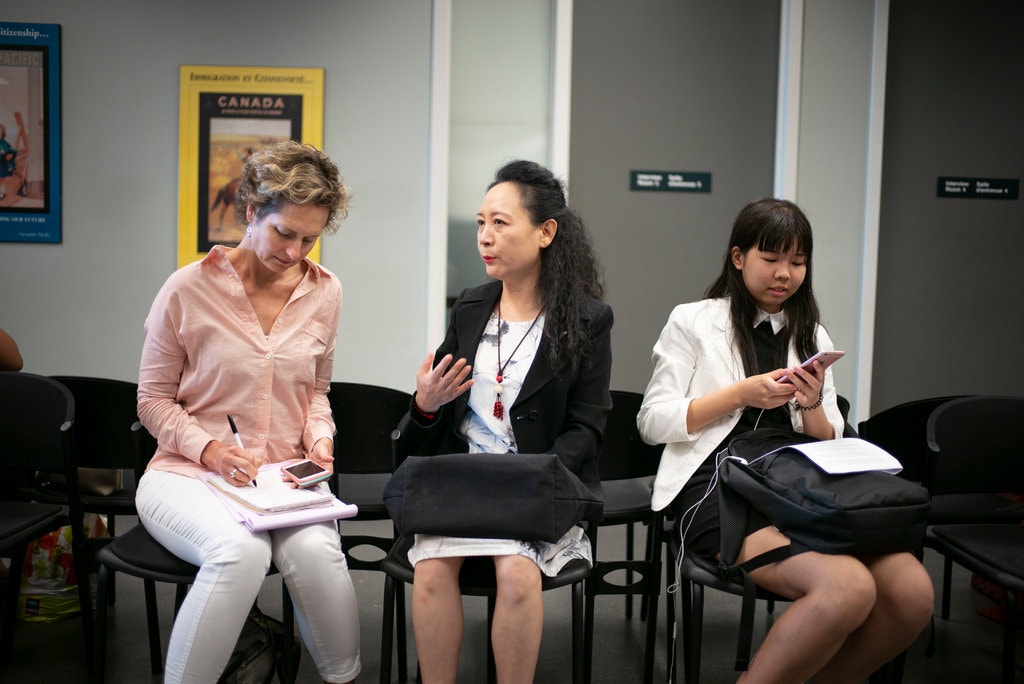 |
|
Catherine Porter interviews Sheng Xue as she helps an asylum seeker in Toronto. Credit...IAN WILLMS FOR THE NEW YORK TIMES |
For the story of Sheng Xue, I simply drove 30 minutes west to her home in Mississauga, and stepped into the world of Chinese democracy activists, connected around the world by common cause and history.
They speak Mandarin, communicate through Listservs and Twitter, and reference events and people rarely noticed by mainstream English-language media.
I had come to learn more about the tactics the Chinese government reportedly used to silence Canadian activists deemed hostile to it. A confidential report by Amnesty International Canada had just been leaked, detailing the troubling experiences of 17 local activists. The person most cited was Sheng Xue.
[Read: Chinese Dissidents Feel Heat of Beijing’s Wrath. Even in Canada.]
When I met her, she opened files on her computer to show me online hookup ads listing her phone number and email address, blog posts with nude photos of her, pictures of a man standing out front of Parliament Hill holding a protest sign that called her a spy.
It seemed like the biggest public shaming campaign I’d never heard of.
I decided to see if I could get to the bottom of it. The investigation took me the better part of a year, in part because the accusations against her were tangled, and in Chinese, but also because I was reporting on a complicated subculture.
I started by hiring a Mandarin-speaking doctoral student, Emile Dirks, to help me research. Together, we dug through hundreds of blog posts, websites, essays circulated on various dissident Listservs, and books, some depicting Sheng Xue as a sexual pariah, a spy, a thief or a fraud.
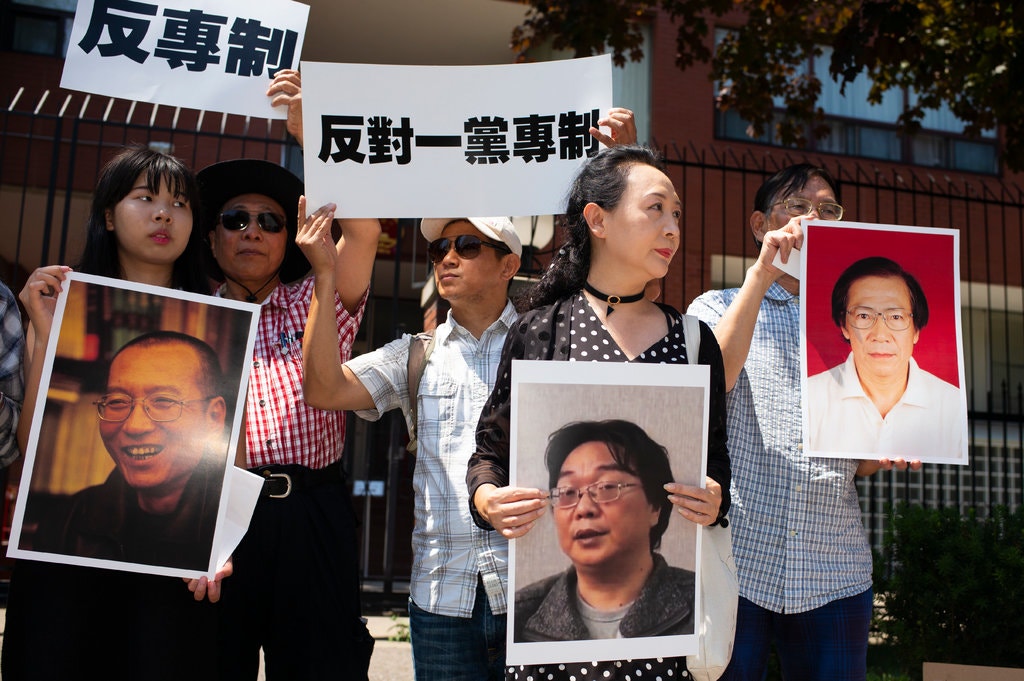 |
|
Sheng Xue at a rally for political prisoners in front of the Chinese consulate in Toronto. Credit...IAN WILLMS FOR THE NEW YORK TIMES |
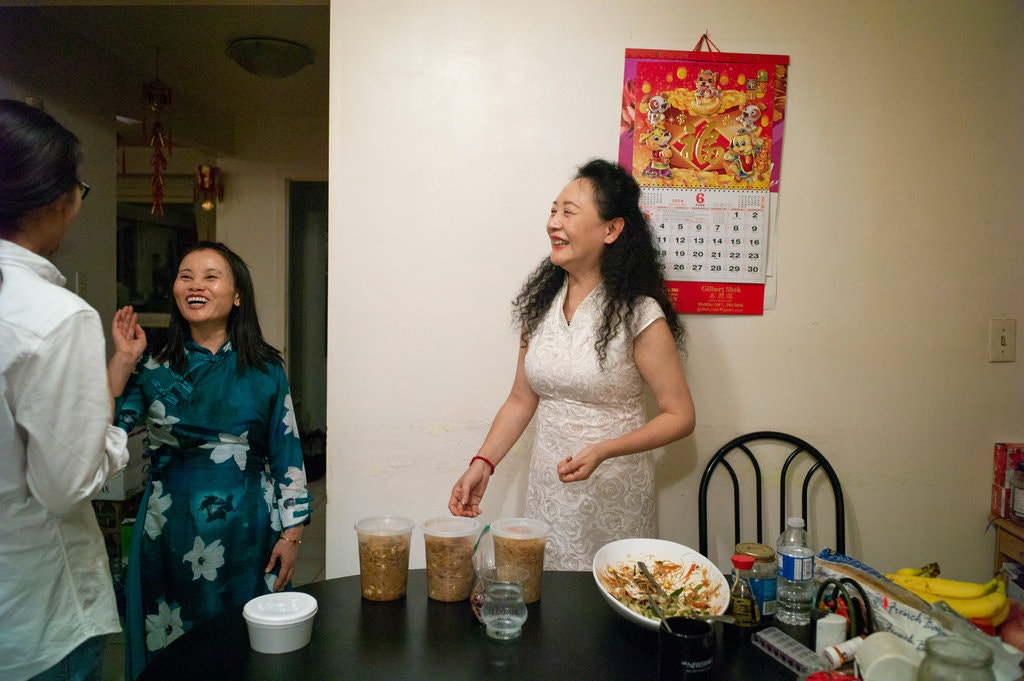 |
|
Sheng Xue with friends and supporters during her birthday party in Mississauga, Ontario. Credit...IAN WILLMS FOR THE NEW YORK TIMES |
My reporting went in many directions: One essay claimed a man had seen Sheng Xue meeting with a People’s Daily reporter late at night, casting suspicion on her as a spy. But when I tracked down the stated witness, he said it wasn’t true.
I interviewed a Chinese diplomat who defected to Australia, other dissidents across Canada and the United States, a radio host in Taiwan, a book publisher in Hong Kong.
We assembled a spreadsheet that stretched 25 pages.
As often happens in this job, many leads went nowhere. Although we dug up the registrations of most websites hosting lewd photos of Sheng Xue, we couldn’t track down the anonymous creators. Many of my emails, calls and letters went unanswered.
But others led to interviews. I met three of her main adversaries in person, and talked to a fourth over Skype, phone and email. (In all cases, I had a translator with me.) These adversaries see themselves as whistle-blowers, not attackers.
“All of her behavior has been exposed,” said Chen Yiran, a former close friend who accused Sheng Xue of pocketing a $100 donation and profiting from aiding “fake refugees” for kickbacks like a television.
“People like her use the banner of opposing the Communist Party, but there is no real difference between them and the Communists,” she said over tea. “Sometimes, they are even worse.”
One pattern that emerged was identity theft. Many of Sheng Xue’s adversaries told a strange story of someone posing as them online to spread more accusations against her.
Many experts, from academics to former intelligence officers and human rights campaigners, said it all reflected a Chinese Communist Party strategy of seeding and stirring division among the dissidents so they were in no position to present a real challenge to the party.
Predictably, the response to my story has been fierce and loud on Twitter, reflecting how fractious the overseas dissident community is. Many replies attacked Sheng Xue and the story, while some defended her.
It’s a debate transpiring almost entirely within the world of Chinese dissidents — a world most Canadians never enter, and one that the past year of reporting helped me begin to understand.
___
This week’s Trans Canada and Around The Times highlights were compiled by Canada correspondent Ian Austen.
Trans Canada
—Whether it’s a turning point or not, Prime Minister Justin Trudeau’s decision to expel Jody Wilson-Raybould and Jane Philpott from the Liberal party was another major moment in the political turmoil surrounding his government.
—“How am I supposed to teach about respect, tolerance and diversity to my students, many of whom are immigrant kids, when the government is asking me to give up who I am?” Dan Bilefsky was asked by an elementary schoolteacher in Montreal who would have to remove her Muslim head scarf or stall her career under proposed Quebec law.
—In the week that the federal government imposed carbon taxes on provinces that refused to put their own systems in place, we looked at the 40 countries that apply some sort of cost to carbon emissions — and how much of an impact the programs are having.
—By day, Toronto native Matt Walker tickles tiny worms while peering at them through microscopes as a neurobiologist at Columbia University in New York. At night he appears in an Off Broadway production as Max, “a hapless actor who cannot stop mugging for the audience while performing in a dusty whodunit.”
Around The Times
—In The New York Times magazine, Jim Rutenberg and Jonathan Mahler carefully dissect how Rupert Murdoch and his family have used their global media empire to destabilize democracies in North America, Europe and Australia.
—”Game of Thrones” is now in its final season. But fans who travel to Northern Ireland can still visit the spot where Melisandre gave birth to the shadow monster.
—”Try cooking 1,400 lamb chops to a perfect medium-rare at the same time, using nothing but sheet pans, Sterno and an upright aluminum cabinet on wheels called a hot box.” That’s among the challenges that confronted two writers found when they went into the world of caterers as cooks.
—Is Patagonia really “leaving the bros out in the cold” by cutting off sales of branded fleece vests to the financial and tech firms where they have become standard business dress? Vanessa Friedman found the reality is a bit more complicated.
We’d love your feedback on this newsletter. Please email your thoughts and suggestions to This email address is being protected from spambots. You need JavaScript enabled to view it.. And if you haven’t done so, please subscribe to the email newsletter version.
URL of the original artical:https://www.nytimes.com/2019/04/05/world/canada/sheng-xue-chinese-activist-smear-campaign.html
- Hits: 5143
- Details
- Written by Site Editor
- Category: Headline News
Chinese Dissidents Feel Heat of Beijing’s Wrath. Even in Canada
|
She thought she would be safe in Toronto. Then she began speaking out against the Chinese government and became the victim of a lurid smear campaign. |
By Catherine Porter
April 1, 2019
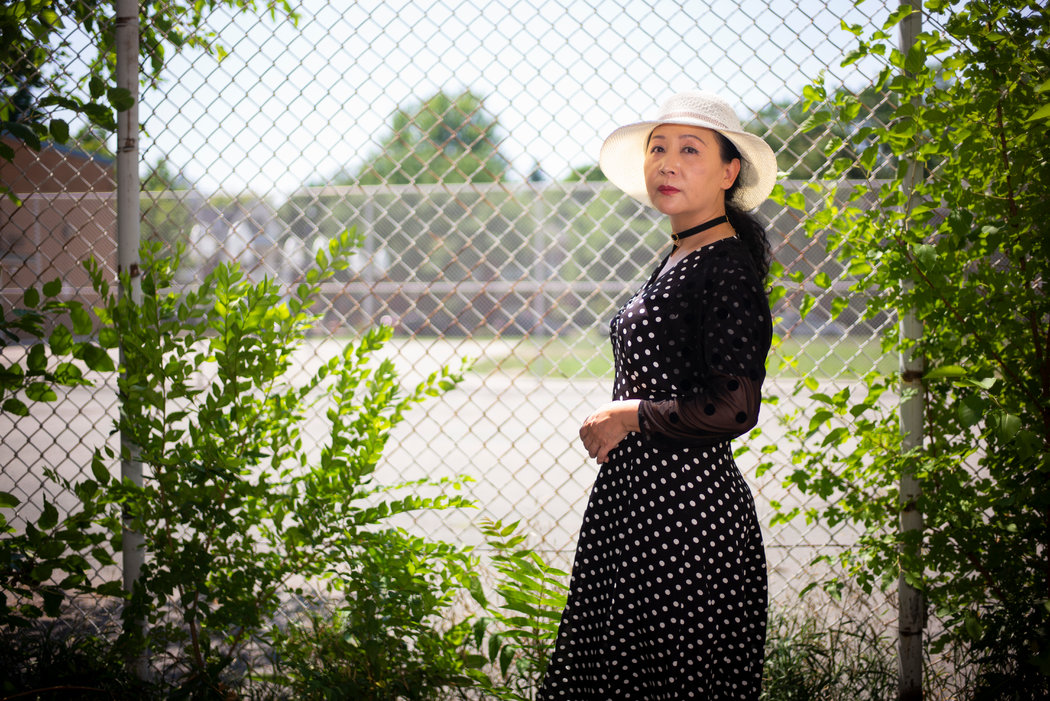
Sheng Xue has been the victim of a relentless smear campaign that experts say has all the markings of a coordinated attack by the Chinese Communist Party.Credit. Ian Willms for The New York Times
MISSISSAUGA, Ontario — Search for Sheng Xue on Google in English and you will find the story of an award-winning writer who left China for Canada after the Tiananmen Square uprising and became one of the world’s leading advocates for Chinese democracy.
But that same search in Chinese comes up with a very different portrait: Sheng Xue is a fraud, a thief, a traitor and a serial philanderer. Want proof? It offers up salacious photos, like one seeming to show her kissing a man who is not her husband.
As China extends its influence around the globe, it has mastered the art of soft power, establishing Confucius Institutes on Western college campuses and funding ports and power plants in developing countries.
But building up is only one prong of the Chinese strategy. The other is knocking down. And few know this better than Sheng Xue.
For more than six years, the Chinese-Canadian activist has been the victim of a relentless campaign to discredit her by blog, Listserv, e-book and social media, which experts say bears the markings of a coordinated attack by the Chinese Communist Party.
“This is a textbook destabilization of the exile movement,” said Nicholas Bequelin, Amnesty International’s regional director for East Asia.
“Since the early 1990s,” Mr. Bequelin said, “China has understood the best way to neutralize this group and prevent them from essentially getting organized is to ensure they have no undisputed figurehead.”
Sheng Xue is the pen name for 57-year-old Zang Xihong. The attacks have left her name — and health — in tatters.
“I escaped Tiananmen Square in China,” she said one winter day sitting in the living room of her suburban bungalow outside Toronto. “I thought I’d have a safe, happy life in Canada.”
But the Communist Party, she said, “was already here.”
The smears cannot be definitively linked to the Chinese government, experts say.
However in Canada, security experts have warned for years about the growing influence of Beijing not only on Chinese expatriates but on the government itself. In 2010, the head of Canada’s intelligence service shocked the country by declaring that the Chinese Communist Party had “agents of influence” in local governments.
And in 2017, a confidential report prepared by the Canadian branch of Amnesty International alerted the authorities to the harassment of Chinese-Canadian activists, the scale of which appeared “consistent with a coordinated, Chinese state-sponsored campaign.”
The dissident who seemed to be getting the worst of it: Sheng Xue.
“I think she’s a victim,” said Andy Ellis, the former assistant director of operations for the Canadian Security Intelligence Service. “I strongly do. I think the Chinese government is trying to sully her reputation to advance their own interests.”
The Chinese Embassy in Ottawa declined to comment.
Rise to prominence. Flood of hate.
Sheng Xue, whose pen name is Mandarin for “abundant snow,” arrived in Canada in August 1989 on a visa to study journalism.
But while she had left China, she could not leave China behind.
Haunted by the sight of soldiers shooting into a crowd close to her family’s apartment during the Tiananmen Square massacre in June of that year, Sheng Xue abandoned her study plans and threw herself into the burgeoning Chinese democracy movement in Toronto. She helped form a local branch of the Federation for a Democratic China, which at its height had 3,000 members in 25 countries.
Despite having forgone a degree, Sheng Xue broke into journalism and fashioned a successful career as a writer. But she was best known for her activism — leading protests, lobbying governments and helping fellow activists with their asylum cases.
In 2012, Canada’s immigration minister gave her a medal for “extraordinary contributions to the country.” A month later, she was elected president of the federation.
The first conference she hosted as the group’s president should have been a moment of glory. Hundreds came from across the globe.
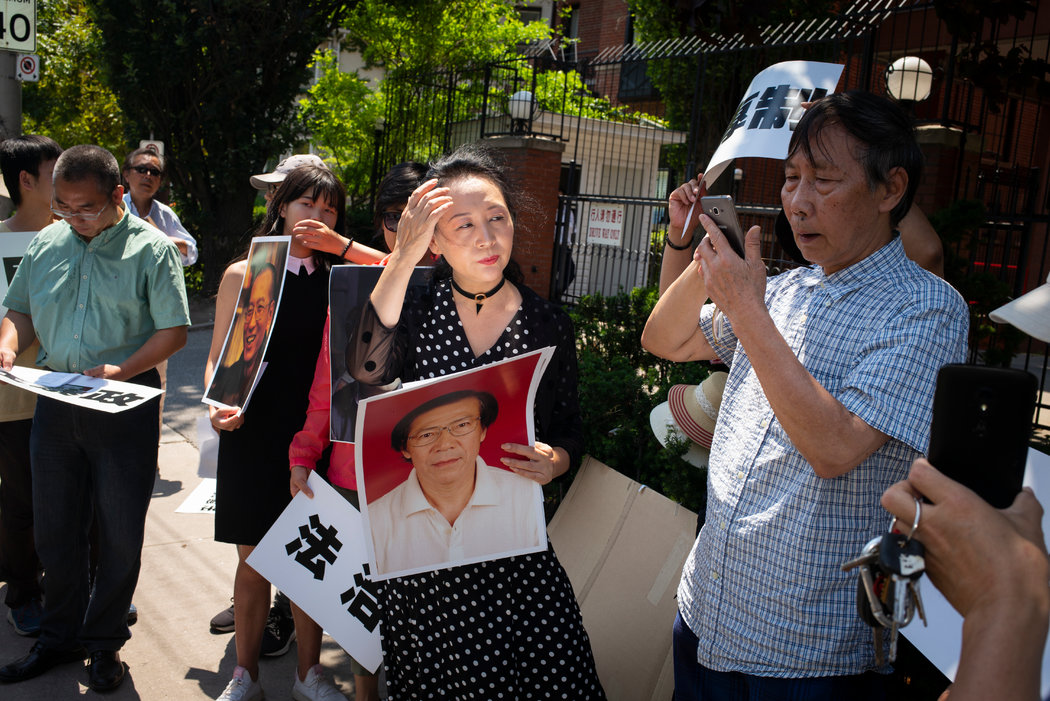 Sheng Xue at a rally last year for political prisoners in front of the Chinese Consulate in Toronto. |
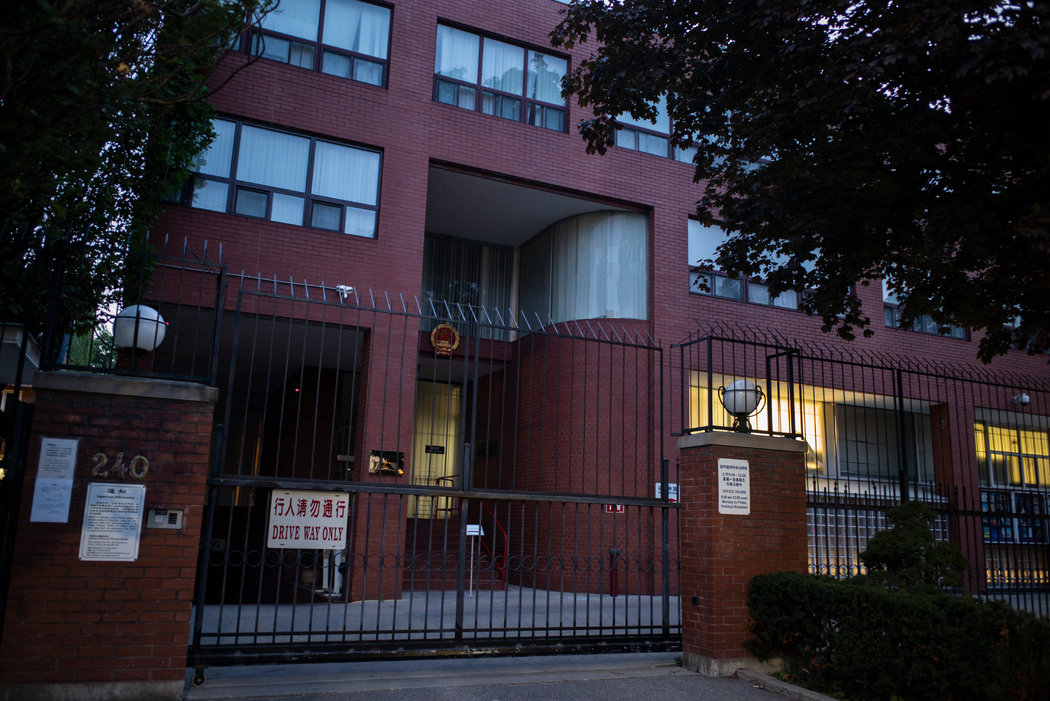 The Chinese Consulate in Toronto. |
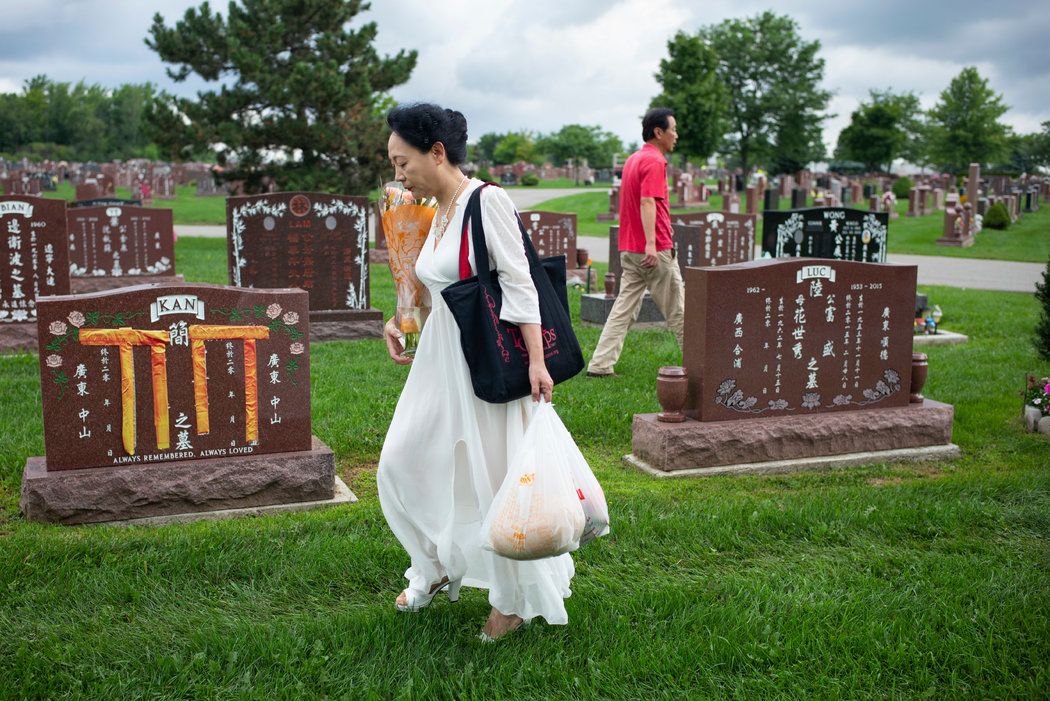 Sheng Xue and her husband, Xin Dong, visiting the graveyard where her parents are buried in Mississauga, Ontario. |
||
| Ian Willms for The New York Times | ||||
The moment she remembers best, however, is stepping off the stage and finding herself surrounded by colleagues holding cellphones. They were showing her emails they had just received, with various photos of her half-naked.
Except they were obvious fakes.
In one photo, Sheng Xue’s face was pasted onto another woman’s body. Another email included a supposed love letter from her to an activist in Australia, so crass, it seemed a parody. The sender appeared to be yet another activist, Chin Jin, but he said the email was a fake.
It was a portent of the harassment to come.
There were sex-wanted ads posted in Sheng Xue’s name. Lurid stories about her sex life. Nude photos were published on a new Twitter account, of higher quality than the first ones, and harder to dismiss out of hand.
Some seemed to capture her kissing the Australian activist, Xiaogang Zhang, although both say they are fakes.
The timing seemed beyond coincidence.
“There has been a pattern,” said Jie Chen, an associate professor of international relations at the University of Western Australia who studies the Chinese democracy movement. Pointing a finger at the Chinese Communist Party, he said, “Whoever is doing well, whoever seems to be effective in damaging the reputation of the C.C.P., all of a sudden they will get attacked very systematically.”
‘I am the real Liu Shaofu’
The attacks appear to exploit tensions within the dissident movement, where Sheng Xue is a polarizing figure.
“People who love her, really love her,” said Michael Stainton, the retired president of the Taiwanese Human Rights Association of Canada. “People who despise her, really despise her.”
Many of her attackers are former friends and colleagues. But in some cases they say their identities were stolen.
Zhu Rui, a Chinese-Canadian author, began questioning Sheng Xue back in 2010, after the two traveled together to Dharamsala, India.
Since then, Ms. Zhu has penned many critical blog posts and assembled two e-books about Sheng Xue, accusing her of lying, personally profiting off refugee applicants and events, and being a fake witness to the Tiananmen Square massacre, among other things.
But in 2011, Ms. Zhu said, someone hacked into her computer, stole an unpublished essay about Sheng Xue and sent it to a dissident group posing as her.
Similarly, Liu Shaofu, an elder of the democracy movement, said an impostor opened a Twitter account with his name and photo to post criticism of Sheng Xue, including one fake nude photo.
Mr. Liu had collaborated with Sheng Xue for years, even living in her basement, but they had a public falling out in 2013.
“I am the real Liu Shaofu,” he wrote in his first tweet after setting up a different account in June 2014. “Don’t you feel ashamed you sent out so many tweets in my name?”
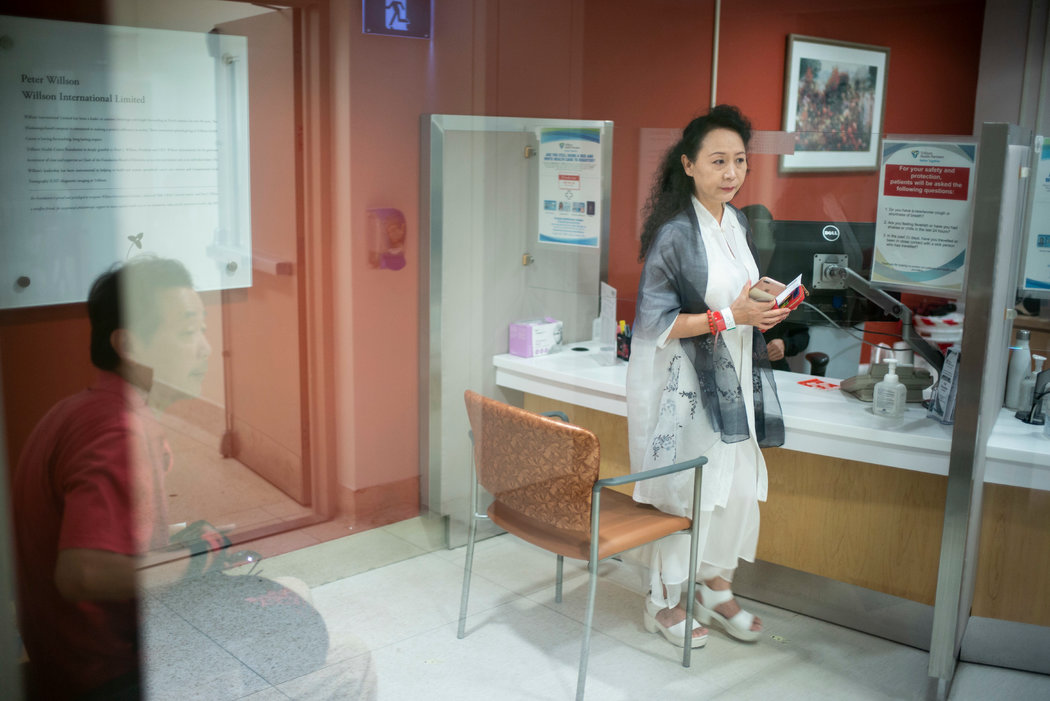 Sheng Xue at a hospital for a CT scan. She says that stress related to ongoing online attacks has compromised her health. |
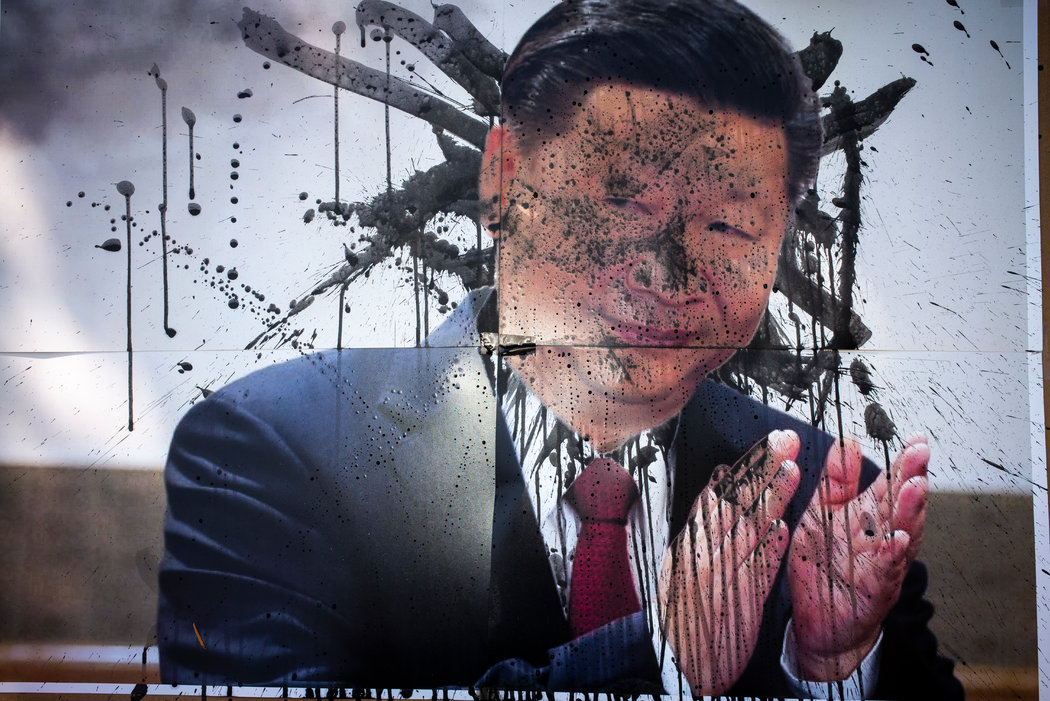 A portrait of President Xi Jinping was defaced at a rally for political prisoners at the Chinese Consulate in Toronto. |
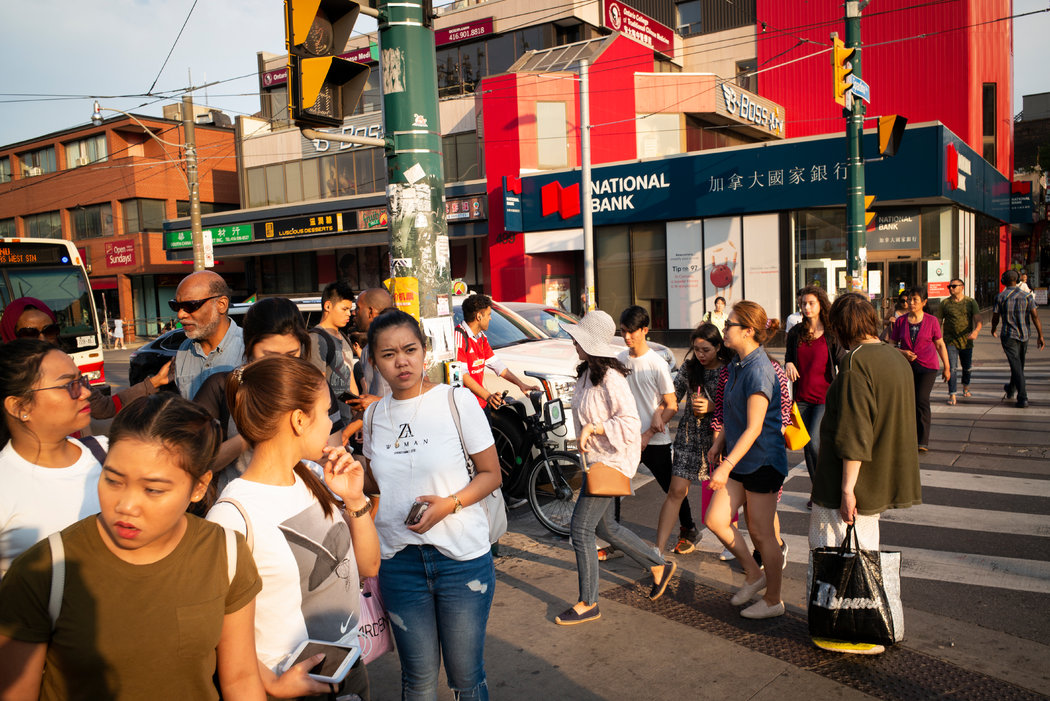 Toronto’s Chinatown district. |
||
| Ian Willms for The New York Times | ||||
Perhaps Sheng Xue’s most vocal critic is Fei Liangyong, a former federation president living in Germany who has accused her of a raft of moral failings, including “sexual impropriety and general wickedness.”
“To not criticize her would run counter to my democratic ideas and bring shame on my lifelong struggle for democracy and constitutional government in China,” he said in an email.
Mr. Fei’s essays have been widely republished on anonymous anti-Sheng Xue blogs. But he said he did not know who was behind them. A Twitter account with his name and photo, which Mr. Fei said he did not create, posted links to one of the blogs.
Many fellow activists, even those who have themselves been targeted by the Chinese government, believe some of the accusations against Sheng Xue.
“The Chinese government tries all means to marginalize, to silence and detain Chinese activists, in China and outside,” said Teng Biao, a civil rights lawyer who escaped China in 2012 and now lives in New Jersey.
But, he added, “what happened to Sheng Xue might be a little complicated, because as far as I know, some claims are true.”
Taken together, a pattern emerges: Doubt is turned into distrust, and dislike into loathing.
“It’s called blowing on the hot coals,” said Mr. Bequelin of Amnesty International.
A movement splintered
Sheng Xue learned the Chinese government had her on its black list in 1996, when she tried to return to Beijing. She was stopped at the airport, interrogated and sent back to Canada the next day.
Since then, it has become clear she remains a target, and at least three comrades in Canada report pressure from Chinese security services over their ties to her.
One, Yi Jun, said every time he returned to China, he was taken to tea by members of the Communist security bureau. “They say Sheng Xue is very counterrevolutionary and a very bad person,” said Mr. Yi, the president of the federation’s Toronto branch.
Another dissident, Leon Liang, said his wife back in Shenzhen was visited regularly by the authorities and given a warning: “If I didn’t inform on Sheng Xue, they would take her job.”
The attacks on Sheng Xue have taken a toll not just on her but on the dissident movement itself. The federation, which had already dwindled to about 100 members, split in two in 2017, with Mr. Fei forming a second group. Sheng Xue has stepped down as president.
The fight was so public and ugly, it tarnished everyone.
One member in Germany distributed an “investigation” a year after the death of Sheng Xue’s mother, claiming that she had pimped out her young daughters, and that it was the source of Sheng Xue’s moral bankruptcy.
“I really lament the fact the organization founded by Tiananmen Square leaders and intellectuals has degenerated to such a miserable state,” said Mr. Chen, the University of Western Australia professor.
Few dissidents will fail to get the message, said Michel Juneau-Katsuya, a former Canadian intelligence officer specializing in China: “If you participate and support these people, look what I can do to you. Your local government won’t be able to protect you.”
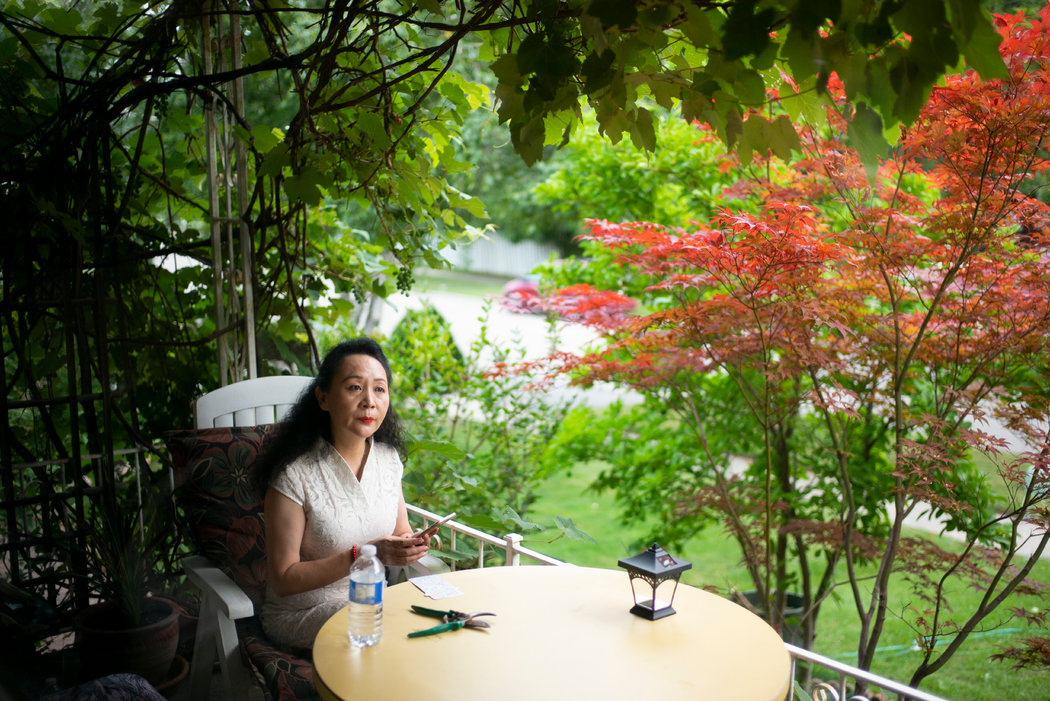 Sheng Xue lives in a bungalow in a suburb of Toronto. Many fellow dissidents stay there, renting rooms in the basement. |
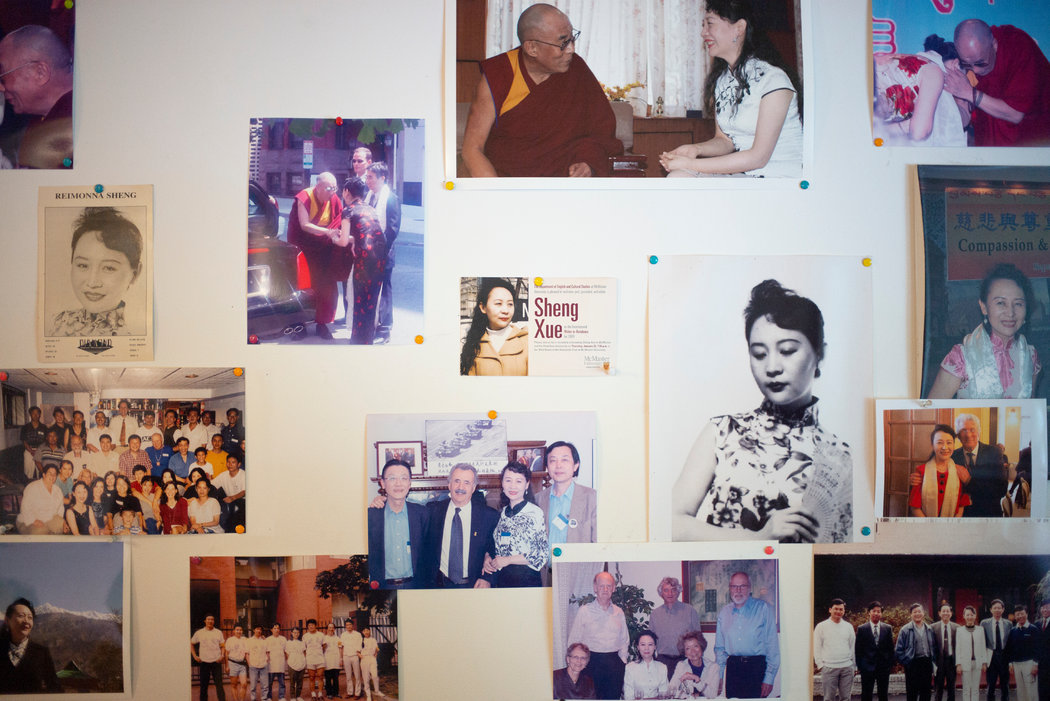 The walls of Sheng Xue’s living room are decorated with photos of her with influential people, including the Dalai Lama and Richard Gere. |
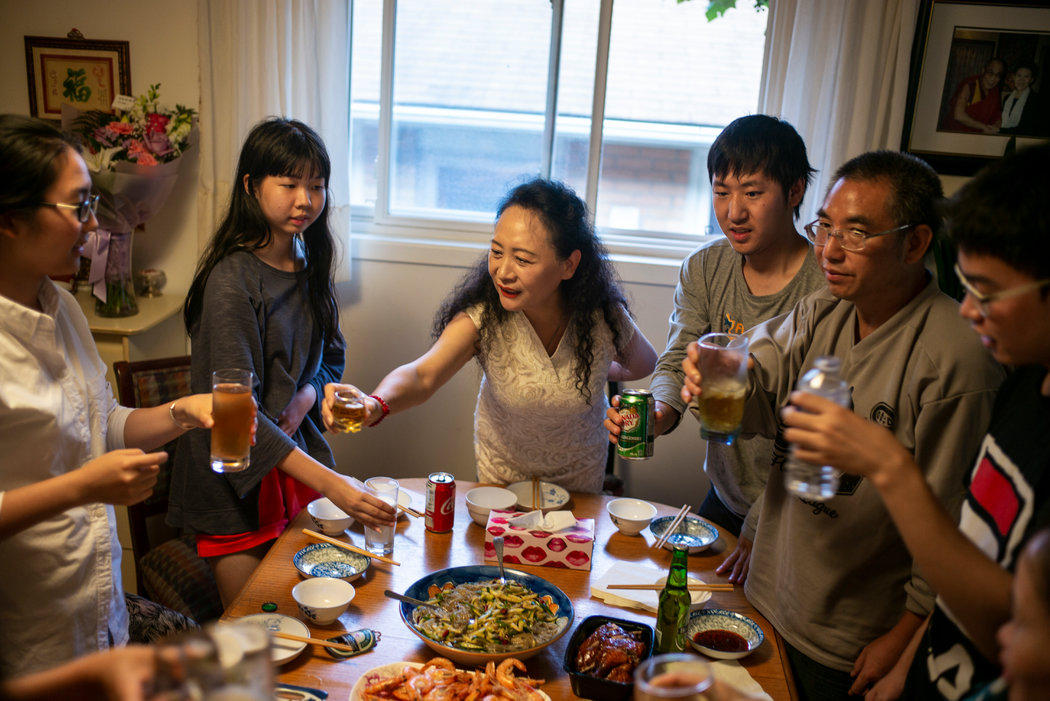 Sheng Xue with friends and supporters during her birthday party. |
||
| Ian Willms for The New York Times | ||||
Sheng Xue continues her activism, but her health has been declining. She has met with doctors about heart palpitations and headaches. She never found an effective defense against the campaign, which she dismisses in totality as lies.
Some of her supporters formed a “Friends of Sheng Xue” organization, declaring the attacks a “threat to Canada’s sovereignty and security.”
They got nowhere.
In its report, Amnesty International urged the Canadian government to fashion a “comprehensive approach to addressing this problem,” and suggested a complaint hotline.
That has not happened.
In 2016, a Chinese-Canadian human rights lawyer, Guo Guoting, volunteered himself as an arbiter between Sheng Xue and Mr. Fei. He considers both friends.
Mr. Guo moved into Sheng Xue’s home for a month and began researching the attacks. But his computer was hacked, he said, and “all the documents disappeared.”
He never published his report.
Research was contributed by Emile Dirks in Toronto and Karoline Kan in Beijing.
A version of this article appears in print on April 2, 2019, Section A, Page 1 of the New York edition with the headline: Even in Canada, a Dissident Feels the Long Reach of China’s Fury
URL of the riginal artical:https://www.nytimes.com/2019/04/01/world/canada/china-dissident-harassment-sheng-xue.html
- Hits: 4976
 English (UK)
English (UK)  中文(简体)
中文(简体)  中文(正體)
中文(正體) 
